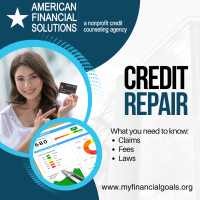“For years we tried to nickel and dime our way out of debt. We owed $68,000 in medical bills and we had a few credit cards. We’d pay one collection account off and then another would turn up. My wages were even garnished. When we finally talked to our counselor at AFS and decided to file bankruptcy it was a HUGE relief. Thanks to AFS I knew what to do to rebuild my credit and I’ve never looked back.”
- Sally – debt free four years
Bankruptcy
We hear from many people considering bankruptcy. Usually, they are overwhelmed with their debts, having trouble making minimal payments, and receiving calls from collection agencies. They are searching for relief from the constant stress of debt.
In this article, we will provide you with some basic information about bankruptcy options, ramifications, and ways for rebuilding after a bankruptcy. We cannot provide you with legal advice, but we can always help you evaluate your current financial situation and help you explore your options.
Standard bankruptcy options
There are two main types of consumer bankruptcy. The first is a Chapter 7 bankruptcy, which is a liquidation of your debt. The other is a Chapter 13 bankruptcy, which is a repayment plan that usually spans 60 months (five years).
In a Chapter 7 bankruptcy, you are relieved of all of your debts, but in exchange you may have to give up any non-exempt property. Exempt property is property that may not be taken by creditors and does not have to be forfeited in bankruptcy. According to the bankruptcy code, exemptions typically include clothing, personal belongings, regular household furniture, one auto, and at least some of the equity in your primary residence.
A Chapter 13 bankruptcy allows you to keep your property, but in exchange you pledge your disposable income towards the repayment of your debt. In a Chapter 13 bankruptcy you must have an income and you must adhere to a court ordered repayment plan. The amount of your payments is based on your income and the amount you owe the creditors. The creditors do not decide how much you must pay each month, the bankruptcy court does. Once you have completed the repayment plan, any remaining debt may be dismissed by the court.
Allowable debts in bankruptcy
In a Chapter 7 bankruptcy, you can eliminate most unsecured debts like credit cards, medical bills, past due utility bills, collection accounts, attorney’s fees and most civil judgments. Some debts that cannot be included in a Chapter 7 bankruptcy include child support and alimony payments, student loans, mortgages (unless you give up the home), and court fines arising from criminal cases. This is not a full list of debts eligible and ineligible for bankruptcy.[1]
In a Chapter 13 bankruptcy, the dischargeable debts are much the same as they are in a Chapter 7. The difference is that instead of being relieved of the duty to pay them back at all, you must make payments towards the debts.
An additional, potential benefit of filing a Chapter 13 is that you can put past-due support payments, criminal traffic fines, and some other non-dischargeable debt into the repayment plan. During the time it is in the bankruptcy repayment plan, the creditors typically cannot take further action against you. Further action may include garnishing wages, revoking a driver’s license, or making constant telephone calls to try and garner a payment. [1]
Impact of Bankruptcy
The impact of declaring bankruptcy can be very difficult to deal with and there are many reasons people seek this type of debt relief. According to a study by Harvard University, the number one reason people seek bankruptcy is due to medical expenses. This is followed closely by job loss and divorce or separation.
Additional stressors occur if debts were joint or included co-signers. The other person may not want to file and your relationship with them may be strained after the bankruptcy is complete. The bankruptcy will impact the credit of anyone who was a joint holder or a co-signer on an account included in the bankruptcy. At the very least, the creditors will look to that person to repay the debt.
Declaring bankruptcy also takes its toll on your credit. Your credit report will reflect the bankruptcy for 10 years. This negatively impacts your credit score as well. It may be more difficult to obtain credit for things like a home or a car. Also, creditors who do agree to lend money will usually charge you a higher interest rate.
Credit after Bankruptcy
It is possible to recover from filing bankruptcy. One recommendation for rebuilding credit is to obtain a secured credit card. While they typically have higher fees and you have to pay a deposit to access them, they can help you build positive credit history. When selecting a secured card, there are several important things to consider such as fees, does the creditor report to the major credit bureaus, what happens to the money you secure your account with, and so on. Read our blog Positive Credit through Secured Cards for more on opening a secured card.
It is possible to obtain an unsecured credit card after filing bankruptcy, because the creditors know you now have to repay the debt – you cannot file a Chapter 7 bankruptcy again for eight years (four if you file a Chapter 13).
Whether you open a secured or unsecured credit card, the key is to use the card wisely. Rather than charge numerous items on the account, use it for one purpose such as to pay a monthly membership fee. This way the debt is a bill you normally pay, and it is a small amount. It does not help your credit score to carry a balance on your credit card.
It is also critical to pay all of your bills on time after you have filed bankruptcy. The only way to prevent negative items from being added to your credit report is by staying current on your payments.
There are certain home loan programs that can work with people who have filed bankruptcy. The Federal Home Administration (FHA) and the U.S. Department of Agriculture (USDA) will back a home loan as long as it has been three years since the person filed bankruptcy.
It takes time and hard work to build credit after filing bankruptcy, but it can be done. The basic tenets of managing money – having a budget, tracking your spending, saving a little of each paycheck, and only borrowing what you can comfortably afford to pay back – are the cornerstones of healthy credit.
If you need help getting your credit back on track or determining the best option for managing your debts, contact a certified credit counselor today. You can reach a counselor by calling the number at the top of your screen or by clicking the Get Started button.
[1] For more information about debts that may be discharged in bankruptcy and to learn more about the bankruptcy process, we recommend you seek legal advice. AFS counselors cannot provide legal advice.




